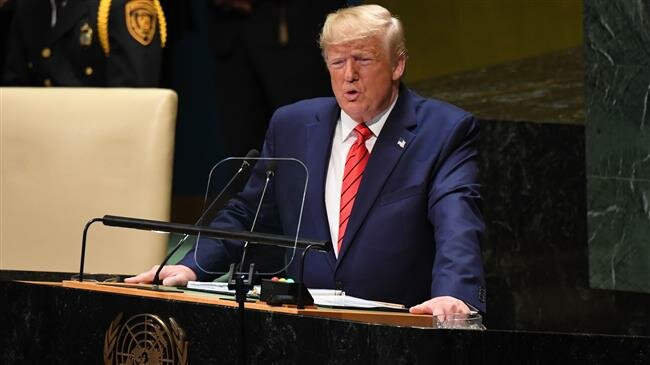Wednesday 25 September 2019 - 11:27
Story Code : 359857
Trump threatens to tighten US sanctions against Iran
"As long as Iran�s menacing behavior continues, sanctions will not be lifted. They will be tightened," Trump said Tuesday at the 74th session of the UN General Assembly in New York.
Trump repeated his baseless accusations against Iran�s civilian nuclear and ballistic missile programs, as well as Tehran�s support for the people in the war-ravaged countries of Syria and Yemen.
The US president also continued to criticize the 2015 nuclear agreement that he withdrew from last year.
French President Emmanuel�Macron�expressed hope in late August that a long-anticipated meeting between the presidents of Iran and the United States would take place at the UN General Assembly.
However, Iran has firmly stated that it won't sit for bilateral talks with Trump�but is open to a multilateral meeting with the P5+1 - including the US - only if Washington ends its economic war against the Iranian nation.
Trump�s speech follows escalating tensions in the Middle East following attacks on Saudi Arabia�s oil facilities.
In his speech, Trump accused Iran of carrying out the attacks.
Iran has rejected claims of involvement in Yemen's retaliatory attacks on the kingdom's heart of oil industry.
Iranian President Hassan Rouhani arrived in New York on Monday to attend the UN General Assembly, where he plans to convey the message of Middle East peace to the world.
�We hope in the very sensitive situation of the region today we would be able to convey the message of our regional nations, which is the message of regional peace and end of any interference in the sensitive regions of Persian Gulf and the Middle East," Rouhani said upon arrival at John F. Kennedy International Airport.
Before leaving for New York, Rouhani told reporters in Tehran that the peace initiative that he will soon unveil at the United Nations General Assembly is aimed at establishing long-term peace in the Persian Gulf, something he said is simply not achievable as long as outsiders are present.
Rouhani said his Hormuz Peace Initiative (HOPE) is designed to include all countries of the region and aims to expand cooperation beyond regional security.
Citing America's military interventions in the Middle East as an example, Rouhani said since entering the region in 2001, the United States has failed to bring back calm to any of the countries that it has deployed forces to.
# Tags











